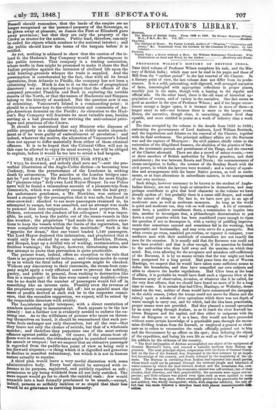THE FATAL "APPETITE FOR STEAM."
"I WILL be drowned, and nobody shall save me"—erst the pro- verbial illustration of the Anglo-Celtic diction—is becoming true Cockney, from the perseverance of the Londoner in seeking death by submersion. The suicides at the London bridges can- not be "put down" by Sir Peter Laurie, and the far more fright- ful "pleasure-trips" defy even Lord Mayor Hooper, In our Police news will be found a tremendous account of a pleasure-trip from Greenwich, which was evidently enough to turn the hair grey. An unfortunate gentleman, a Mr. Hawkins, was enticed on board a steamer by the presumption that it was safe, but found it over-crowded : shocked to see more passengers crammed in, he attempted to escape, but was assaulted, and an attempt was made to pummel him into resignation. A steam-boat proprietor, Mr. Hotson, extenuated the conduct of his colleagues : it was impos- sible, he said, to keep the public out of the steam-vessels in this fine weather; the proprietors "had made the most active exer- tions to keep the vessels within the limits of the registration, but were completely overwhelmed by the multitude." Such is the " appetite for steam," that one vessel landed 1,140 passengers. The Lord Mayor deplored this infatuation, and prophesied that it would only be checked by some calamity. Hawkins, Hotson, and Hooper, kept up a doleful trio of wailing, recrimination, and fruitless warnings; the Mayor, however, threatening some ulte- rior attempt to prove that prevention is quite practicable. The present want, indeed, offers no exception to the rule that there is no grievance without redress ; and various modes do occur to us in which the fatal influx of passengers might be checked. Without any discourtesy to their customers, the steam-boat com- pany might apply a very effectual screw to prevent the nobility, gentry, and public in general, from rushing to destruction like ties to a treacle-pot : if the fare were raised—say doubled—there can be no doubt that the number of passengers would fall off in something like an inverse ratio. Possibly even the revenue of the proprietary company might fall off: but so painful must the sense of profits derived at such risk be to the corporate consci- ence, that the recondite suggestion, we expect, will be seized by the respectable directors with avidity. The Legislature might interpose, with a direct restriction of numbers according to measurement. Such appears to be the law already : but a further law is evidently needed to enforce the ex- rting one. As to the wilfulness of persons who insist on thrust- ing themselves on board, it should be remembered that such per- verse fools endanger not only themselves, but all the rest—that they brave not only the chance of suicide, but that of a wholesale murder; and therefore they perpetrate one of the most serious offences against public safety. Of course, if the steam-boat of- ficers were in earnest, the obtruders might be punished summarily for assault or trespass : but we suspect that an obtrusive passenger is regarded from the paddle-box point of view as being only a too forward sixpence,—a thing which it is dignified and generous to decline in manifest redundancy, but which it is not in human nature actually to repulse.
A third plan would leave a very useful discretion with some administrative body. Every boat should be surveyed with re- ference to its purpose, registered, and publicly reported as safe ; permission to ply being withheld from all not duly certified. The mere report would go far to check the suicidal rush : few would acramble into a boat formally proclaimed to be unsafe,—except, indeed, persons so selfishly reckless or so stupid that their lose Would be no grievance to surviving humanity.


























 Previous page
Previous page